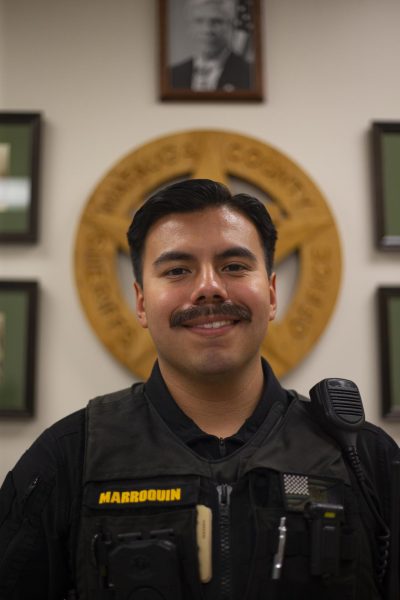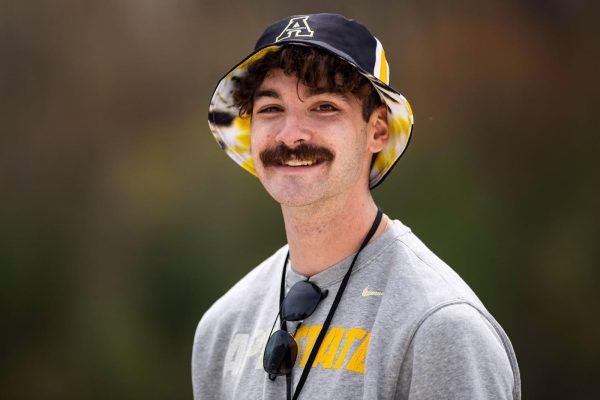As the High Country’s Hispanic population grows and flourishes, two Watauga County Sheriff’s deputies have worked to improve the relationship between law enforcement and the Latino community.
Deputies Derick Zamora and Tony Marroquin — cousins raised in Wilkes County — are fluent in Spanish and routinely work with Latino residents, many of whom do not speak English.
“There’s the fear that they can’t communicate that deters them from calling, or that police are always out to get Hispanics,” Zamora said. “I just always wanted to be a part of law enforcement because you can really help people out and bridge that gap.”

Zamora, whose parents immigrated to the U.S. from Mexico and Guatemala, joined the Watauga County Sheriff’s Department in 2022. Marroquin joined the department in May after taking a ride-along with Zamora in 2023.
To combat the language barrier many Latino residents face, Zamora and Marroquin answer Spanish-speaking callers dialing the Sheriff’s Department and regularly visit predominantly Hispanic neighborhoods near Boone, such as the mobile home parks near Brook Hollow Road and Rocky Branch Creek on Old U.S. Highway 421. Marroquin said he spends around 40% of his shifts assisting the Hispanic community and visits the neighborhoods weekly.
“Just about everyone I’ve had to help out is originally here to work,” Marroquin said. “The majority of the ones who can’t speak English that I translate for are typically immigrants.”
According to 2020 census data, about 7% of Watauga County’s population consists of Hispanic or Latino residents — a figure that has doubled since 2010 and quintupled since 2000. However, Zamora predicts the number could be even higher if accounting for seasonal workers and immigrants lacking permanent legal status, who often struggle to obtain the necessary identification to work such as social security cards and driver’s licenses.
“When we do road checks, sometimes I have to pull the car over and if there’s immigrants who are in the vehicle, 9 times out of 10 they’re not gonna have a driver’s license due to that reason,” Marroquin said. “Sometimes the only form of identification they have is a passport from their home country.”
According to United We Dream, North Carolina is one of 34 states that does not allow people without permanent legal status to obtain a driver’s license, even if an individual has a social security card.
“They often feel like if they get pulled over, they’ll get deported or put in jail or get in trouble,” Zamora said. “When we get there, we’re going to say, ‘Hey, what do you need help with, what’s going on?’”
Marroquin said if he encounters those without necessary identification or documentation, he usually issues warnings.
“Unless there’s a felony involved, typically every traffic stop is up to the officer’s discretion,” Marroquin said. “My parents were in a similar position while I was growing up, and I know how hard it is, so if they’re being cooperative, and I know they’re here legitimately for work, I’ll just give them a warning and tell them to be careful.”
In North Carolina, one in nine workers are immigrants, according to the American Immigration Council in 2018.
Marroquin said language barriers can create altercations between Hispanic residents and neighbors, which he sometimes mediates.
Zamora said he met a Hispanic woman whose neighbor would “shout racist things to her and her children,” but law enforcement was not able to intervene due to the absence of a communicated threat or trespassing.
“They come to misunderstandings a lot and have verbal arguments,” Marroquin said. “I’ve had to go down there before and try to explain to both neighbors what their reasoning is.”
Since he was hired, Zamora said he’s seen improvement in the relationship between law enforcement and the Hispanic community, bolstered by community events like Coffee with a Cop, an annual collaboration between Boone-based blog Q’Pasa Appalachia and local law enforcement during which Hispanic residents can voice concerns and interact with officers.
“Even if it’s just a little different, there has been some trust built there,” Zamora said. “We’re not here to hassle or harass them; we’re here to help.”
Para leeren español haz clic aquí.



